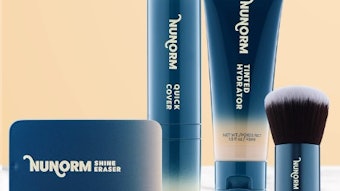Momentum is growing in the areas of naturals and natural product sustainability, and global cosmetic and personal care markets benefit from increased interest and spending. The new naturals consumer, in addition to interest in organic foods and natural health care methods, is interested in appearance and personal care as a means of preventive health care.
According to Euromonitor, consumers are increasingly aware of their health from a holistic standpoint and value the recognition of beauty as an outer reflection of that. The realization that both are integral to one another has affected demand for natural and organic ingredients.
The link between nutrition and beauty, says Euromonitor, is becoming well understood, inspiring beauty supplements such as Inneov from L’Oréal/Nestle and functional food-based cosmetics, including Origin’s mushroom-based antiaging line, endorsed by Dr. Andrew Weil. Still, other marketers are rolling health care and beauty into overall treatment programs. Murad Inclusive Health Center, for example, offers visitors the Murad Method Program—combining diagnostic tests, skin analysis and nutritional evaluations with treatments that include topical, internal and stress reduction recommendations to promote longevity and healthy beauty from the inside out.
Conscience and Economics Converge
While the terms “naturals,” “organics” and “ethically wild crafted” are becoming familiar vernacular in the beauty and health arena, both manufacturers and consumers are feeling their way through a transition as conscience and economics converge. The natural personal care market, says Darrin Duber-Smith, president of Green Marketing, Inc., is currently valued at $6.5 billion, and the category has been growing at 15% annually for the past 10 years. “That is significant growth as the whole personal care market is growing at 3%,” said Duber-Smith.
Natural remains a decidedly ambiguous term. Unlike organic, which is strictly regulated by federal organic food guidelines, the word natural is variously defined to include products that may contain ingredients that are naturally derived or contain a certain percentage of natural materials. “You can’t define a natural product until you define a natural ingredient; for example, ‘derived from nature and naturally processed,’ meaning it is not synthetic and not synthetically processed. Animal, vegetable and mineral is natural, but if you introduce synthetic processing, it’s no longer natural,” says Duber-Smith. “Organics have been defined and the organics industry has a competitive advantage, which will cross over into personal care. Since the naturals industry is 10 times larger than the organics industry, it is important to have a clear definition and understanding of naturals to eliminate potential consumer confusion.”
While Duber-Smith notes many formulators are comfortable working with synthetics, there is a need to update as consumer demand increases. According to Duber-Smith, the biggest issue is preservatives, citing the reluctance to use parabens. “There are natural preservatives that really work,” says Duber-Smith, adding that their adoption by manufacturers has been slow.
According to the Natural Marketing Institute, 45% of the general population believes that natural and organic products for skin care are as important as healthy foods. Natural Food Merchandiser, based in Colorado, stated 50% of American households use organic products. Major consolidation is occurring within this well-established trend. For example, Hain Celestial acquired JASON Natural Products, which increases its product availability and has been seen as an indication of maturity in the market. In addition, growth rates are still high. Many companies, whether on the supply or finished product side, are following the demands of the market as products enter broader distribution channels.
Supply and Demand
Numerous developments in botanical sourcing, processing and delivery are taking place among a wide range of suppliers, from those who are specifically organic to those who are combining technologies and creating synergies between ingredients, processing and delivery.
Bio-Botanica features nutraceuticals, herbs (available certified organic), floraceuticals, botanical extracts and more. The company offers expertise in fortifying formulas with combinations of natural ingredients and blends. “We are known for the development of innovative functional products customized to the customer’s specifications,” says Mark Sysler, vice president of sales.
Sysler observes two areas of strong demand in cosmetics and personal care. “One such area is the use of all natural preservatives and the elimination of artificial or synthetic preservatives. Bio-Botanica has developed three all natural preservatives, Biopein, Neopein and Suprapein. These preservatives deliver broad-spectrum activity against a wide range of organisms. The other area of strong demand is antiaging.” Sysler adds that the area of organic-specific materials is growing, but the consumer needs to accept the higher costs and pricing that go along with the organic products.
“The industry needs to be creative and bring new products to market continuously to peak the interest of the consumer,” says Sysler. “Condition-specific products will grow the quickest, and the areas of antiaging and wellness will grow the most. Most of all, the ‘snake oil’ companies need to be put in check to prevent negative publicity and keep natural products and organic products pure.”
Consideration of Environmental Impact
Wellness and healthy beauty have also given rise to the ethical consumption trend that has emerged within the areas of cosmetics and toiletries, which, says Euromonitor, is borne out of the demand for natural/organic ingredients. In addition, worldwide recognition of the effect of various chemicals on water and soil supplies has drawn attention to recycling and biodegradability for personal care products.
“Biodegradability of personal care products is becoming more and more important worldwide,” says Wolfgang Goertz, marketing manager, personal care North America, Goldschmidt Chemical Corporation, a wholly owned subsidiary of Degussa Corporation. “Some European countries—for example, Scandinavia—have started to allow only biodegradable ingredients for rinse-off products like shampoos.”
According to Goertz, more than 80% of the company’s products are based on natural raw materials, including vegetable-derived fats and oils, fatty acids, sugars and sugar derivatives such as saccharose and sorbitol. “Degussa, to the best of our knowledge, is the only supplier in the personal care market to provide enzymatically manufactured esters,” he adds. These products are 100% natural and their enzymatic manufacturing process is highly eco-friendly. “The process allows the esterification reaction to be run at much lower temperatures than if a conventional chemical process were used. In addition, much less energy is consumed and far fewer by-products are made, which leads to the reduction of clean-up steps and waste,” says Goertz. “We have calculated a life cycle assessment (LCA) for our enzymatic esters that shows savings of energy and emissions—for example, those related to global warming—of 60–75%.”
With a focus on biodegradability, Goldschmidt Chemical Corporation has achieved certification on 33 of its products from Ecocert, the control and certification organization accredited by COFRAC, the French committee for accreditation.
Exploitation of developing labor markets has gained attention, and consumers have developed a conscience that demands products that fit with their values. Draco Natural Products, for example, noted that in addition to working closely with their cultivators to source certified organic extracts, they are also committed to “ethically wild crafted ingredients.” Wild crafting is the practice of gathering plant materials from their native wild environment in a manner that causes the least disruption and exhibits sensitivity to the natural ecosystems, thereby ensuring the survival and ecological balance of the stand. Engaged companies, therefore, conduct themselves with a high level of consciousness for the well-being of the planet.
“The International Standard for the Sustainable Wild Collection of Medicinal and Aromatic Plants (ISSC-MAP) offers the first program of its kind, which attempts to establish a universally certified protocol for ethical wild crafting,” said Mike Irwin, director of business development, Draco Natural Products. He notes that while Draco is not the only company that practices ethical wild crafting, it works with a large number of different raw material suppliers that do, and its product line consists of a large percentage (70%) of ethically wild crafted botanicals. “This makes Draco one of the largest suppliers of ethically wild crafted botanicals extracts,” said Irwin. In addition, the company never harvests more than one-third of an individual stand of plants, and if possible, the spot is reseeded.
There are, however, no universally accepted or certified ethical wild crafting practices in place; the practice is left to environmental organizations found in the country of harvest.
Finished Products with Natural Appeal
The industry abounds with natural, organic/natural and synthetic blend options whose appeal is unmistakable to the growing legion of healthy beauty converts, and savvy marketers recognize the desire for natural products and look for innovative ways to open product niches. JASON Natural Personal Care Products, for example, utilizes healing herbs, organic ingredients and innovative manufacturing techniques in the creation of its product lines. The company’s Wild Yam Deodorant Stick, 70% Organic, is formulated with green tea and valerian extracts, plus vitamins B5 and E, and was created to deliver comforting freshness during PMS and menopause. Natural Skincare also believes its customers should benefit from nature and be educated to care about the ingredients in their skin care, just as they care about the ingredients in their food. Zia, also owned by the Hain Celestial Group, is committed to creating beauty products using whole foods, pure essential oils and healing botanical extracts. The brand combines the company philosophy of natural skin care with a practical social corporate conscience. As a result, this brand appeals to its consumers’ sense of physical and mental well-being.
At the same time, brands can appeal to consumers through the philosophies and policies behind their products. Liz Earle Naturally Active Bodycare was created by an active proponent of the “green lifestyle,” Liz Earle, who began her career as a health and beauty editor of Woman’s Journal magazine in the U.K. The company, which is nicknamed The Greenhouse, is run on green principles—including a ground source heat pump and rainwater harvesting system, which collects rain from roof panels. Her skin care products are not tested on animals, do not contain mineral oil, but are made with plants and botanicals, providing an eco-friendly alternative to petro-chem synthetic ingredients. The company employs two ethnobotanists who source the safest ingredients, as well as measure environmental impact. Living up to green philosophies through manufacturing practices demonstrates a commitment appreciated by a growing market segment.
Growing innovation in both sourcing and marketing naturals and continued positive response from consumers will continue to strengthen the links between nutrition, well-being and beauty. Marketers would do well to ride the unstoppable green wave to continue engaging consumers with growing choices.










